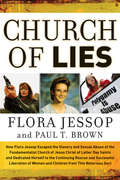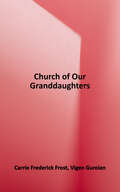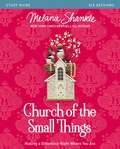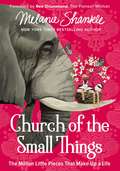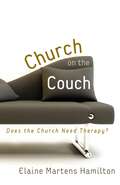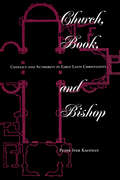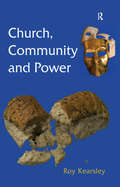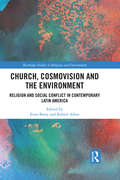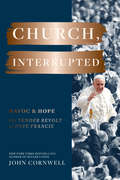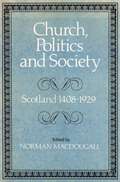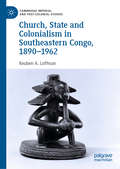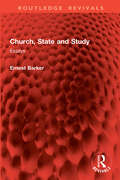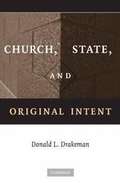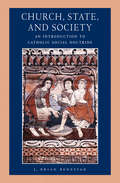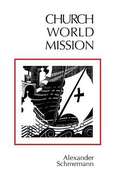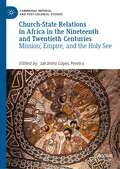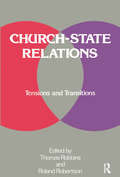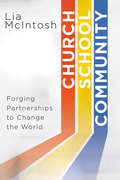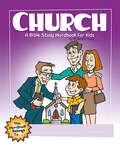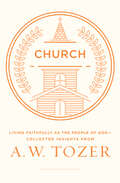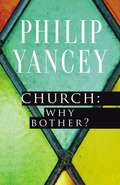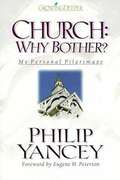- Table View
- List View
Church of God at the Crossroads
by Gilbert W. StaffordDiscusses challenges and opportunities facing the Church of God Reformation Movement.
Church of Lies
by Flora Jessop Paul T. BrownThe author details her escape from a life of sexual abuse and slavery, her subsequent battles with drug addiction and ultimately her role as an outspoken advocate for women's rights and a harsh critic of the FLDS. Written for general readers who won't flinch at the graphic details of the author's abuse, this book also makes a distinction between the fundamentalists and the mainstream LDS, calling the former group a "renegade and abusive cult." Annotation ©2009 Book News, Inc., Portland, OR (booknews.com)
Church of Our Granddaughters
by Carrie Frederick FrostThis is a visionary work of theology and ethics that looks hopefully and lovingly two generations into the future, imagining the Orthodox Church's practices and realities rightfully aligned with its core theological teachings and truths regarding women. This reverent but bold work offers the necessary insight and inspiration to create a community that welcomes all its members, our granddaughters as well as our grandsons, thus allowing the Orthodox Church to better incarnate its mission of service and transfiguration.
Church of the Small Things Study Guide: Making a Difference Right Where You Are
by Melanie ShankleIt doesn’t matter how old we are or what kind of work we do, we’ve all wondered at times, “Does my life really matter?” Do the everyday events and messy moments make any kind of difference? Is it okay to be fulfilled by the simple acts of raising kids, working in an office, and cooking chicken for dinner? This six-session video Bible study with bestselling author and popular blogger Melanie Shankle speaks directly to the heart of women of all ages who are longing to find significance and meaning in the normal, everyday world of attending class on their college campus, driving carpool to soccer practice, cooking a meal for their family, taking care of a sick loved one, or a million other things. Melanie offers women the opportunity to embrace what it means to live an abundant and incredibly meaningful life finding beauty and laughter in all the small things right beneath the surface of every moment.This study guide is full of relatable Bible teaching and includes video notes, group discussion questions, partnered or individual activities, and between-session personal studies.Sessions include:Being Faithful in the Small ThingsCreated for a ReasonA Word Fitly SpokenBroken PiecesInvesting in FriendshipsBigger than You ImagineDesigned for use with the Church of the Small Things Video Study (9780310081364).
Church of the Small Things: The Million Little Pieces That Make Up a Life
by Ree Drummond Melanie ShankleIs my ordinary, everyday life actually significant? Is it okay to be fulfilled by the simple acts of raising kids, working in an office, and cooking chicken for dinner?It’s been said, “Life is not measured by the number of breaths we take, but by the number of moments that take our breath away.” The pressure of that can be staggering as we spend our days looking for that big thing that promises to take our breath away. Meanwhile, we lose sight of the small significance of fully living with every breath we take.Melanie Shankle, New York Times bestselling author and writer at The Big Mama Blog tackles these questions head on in her fourth book, Church of the Small Things. Easygoing and relatable, she speaks directly to the heart of women of all ages who are longing to find significance and meaning in the normal, sometimes mundane world of driving carpool to soccer practice, attending class on their college campus, cooking meals for their family, or taking care of a sick loved one.The million little pieces that make a life aren’t necessarily glamorous or far-reaching. But God uses some of the smallest, most ordinary acts of faithfulness—and sometimes they look a whole lot like packing lunch. Through humorous stories told in her signature style, full of Frito pie, best friends, the love of her Me-Ma and Pa-Pa, the unexpected grace that comes when we quit trying to measure up, and a little of the best TV has to offer, Melanie helps women embrace what it means to live a simple, yet incredibly meaningful life and how to find all the beauty and laughter that lies right beneath the surface of every moment.
Church on the Couch: Does the Church Need Therapy?
by Elaine Martens HamiltonThough most church leaders crave authenticity in their congregations, most also know it is an elusive goal. People by nature are self-protective. And although the gospel message that we are all sinners saved by grace ought to make people more real, the truth is many of our churches are plagued by fakeness. This inauthenticity hinders spiritual and emotional health and maturity. So what's a church leader to do? The key, says Elaine Hamilton, is to go beyond talking about doing things differently. We have to act and live differently. It begins with leaders; the people will follow. We need to tell the truth about who we really are, and then provide forums for others to do the same. Church on the Couch helps you take practical steps toward changing the culture of your church. As the masks come off, the healing and growth will begin.
Church, Book, and Bishop: Conflict and Authority in Early Latin Christianity (Explorations: Contemporary Perspectives on Religion)
by Peter Iver Kaufman<p>Christianity took root and grew within a far-flung empire under complicated and widely varying sets of influences. Under these conditions, the problem of establishing doctrinal and institutional coherence and consistency was acute. In this engaging and authoritative book, Peter Kaufman tells a number of stories from the early clerical history of the church to illustrate how authority came to be shared among the institutions of church, book, and bishop. <p>Kaufman offers vignettes drawn from the first seven centuries of Christian clerical life that reflect the struggle to devise management strategies for resolving theological, political, and social conflict. Most accounts of this period emphasize the conflict. This book tells the other side of the story: the work of reconciliation and the efforts of executives to build, repair, and maintain consensus. <p>This is unabashedly a book about elites, for it was on them that the battle against nonconformity and anarchy was thrust. Tertullian and Augustine of Hippo have pride of place, but we also meet Cyprian, Gregory, Ambrose, and others. They were leaders of a very different age, an age that not only shaped Latin Christendom but also left in place the mechanisms for authority, reconciliation, and conflict resolution that characterize Christianity today. <p>Church, Book, and Bishop tells an important story in a way that will appeal to a wide range of readers, including scholars, students, and general readers. It will be especially useful as a supplement to courses on the history of Western civilization, early Christianity, and the early church.</p>
Church, Community and Power
by Roy KearsleyIn the era of 'post-Christendom', how can church as a sociological reality be switched on to the destructive dangers, yet constructive possibilities, of 'power' flowing in and around its community? Attuned to the current distrust of church power, this book creatively works out responses that could turn painful censure into a re-visioning of church power relations, helped by neglected critical studies. The approach exposes a complexity to power, and filters that insight into a theology of church. The book shows how lessons are available for a religious community from post-modern philosopher Michel Foucault and from recent feminism. The topic of power has universal importance in the study of religion, though the response to analysis and critique in this book is drawn specifically from Christian sources. Kearsley concludes with an exploration for a future renovated, self-critical, authentic and growing community, sensitive to power while remaining in line with classic Christianity.
Church, Cosmovision and the Environment: Religion and Social Conflict in Contemporary Latin America (Routledge Studies in Religion and Environment)
by Evan Berry Robert AlbroThough currently only partially understood, evolving interactions among Latin American communities of faith, governments, and civil societies are a key feature of the popular mobilizations and policy debates about environmental issues in the region. This edited collection describes and analyses multiple types of religious engagement with environmental concerns and conflicts seen in modern Latin American democracies. This volume contributes to scholarship on the intersections of religion with environmental conflict in a number of ways. Firstly, it provides comparative analysis of the manner in which diverse religious actors are currently participating in transnational, national, and local advocacy in places such as, Peru, Argentina, Brazil, Bolivia, Ecuador, Guatemala, and Mexico. It also considers the diversity of an often plural religious engagement with advocacy, including Catholic, Evangelical and Pentecostal perspectives alongside the effects of indigenous cosmological ideas. Finally, this book explores the specific religious sources of seemingly unlikely new alliances and novel articulations of rights, social justice, and ethics for the environmental concerns of Latin America. The relationship between religion and environmental issues is an increasingly important topic in the conversations around ecology and climate change. This book is, therefore, a pertinent and topical work for any academic working in Religious Studies, Environmental Studies, and Latin American Studies.
Church, Interrupted: Havoc & Hope: The Tender Revolt of Pope Francis
by John CornwellChurch, Interrupted: Havoc & Hope: The Tender Revolt of Pope Francis is a revealing portrait of Pope Francis's hopeful yet controversial efforts to recreate the Catholic Church to become, once again, a welcoming place of empathy, love, and inclusiveness.Bestselling author, Vanity Fair contributor, and papal biographer John Cornwell tells the gripping insider story of Pope Francis's bid to bring renewal and hope to a crisis-plagued Church and the world at large.With unique insights and original reporting, Cornwell reveals how Francis has persistently provoked and disrupted his stubbornly unchanging Church, purging clerical corruption and reforming entrenched institutions, while calling for action against global poverty, climate change, and racism.Cornwell argues that despite fierce opposition from traditionalist clergy and right-wing media, the pope has radically widened Catholic moral priorities, calling for mercy and compassion over rigid dogmatism. Francis, according to Cornwell, has transformed the Vatican from being a top-down centralized authority to being a spiritual service for a global Church. He has welcomed the rejected, abused, and disheartened; reached out to people of other faiths and those of none; and proved a providential spiritual leader for future generations.Highly acclaimed author John Cornwell's riveting account of the hopeful—and contentious—efforts undertaken by Pope Francis to rebuild the Catholic Church.• Well researched and brilliantly written, readers, scholars, and fans of John Cornwell will want to read his most controversial and compelling work yet.• More than a third of America's 74 million Catholics said they were contemplating departure in 2018. It is estimated that over the past twenty years, the Catholic Church has been losing $2.5 billion dollars annually in revenues, legal fees, and damages due to clerical abuse cases. The decline in church attendance, marriages, and vocations to the priesthood and sisterhood tell a story of major decline and disillusion. Cornwell showcases Pope Francis's way forward, a hopeful message that gives reinvigorated reasons to stay with the church and help be the change the new generation would like to see.• For readers within and outside Catholicism fascinated by the future and restructuring of the church, this will be a book they want to read again and again as the church continues to change and grow.
Church, Politics and Society: Scotland 1408–1929
by Norman MacdougallThe essays in this volume, by distinguished historians, deal with the correlation of the Church and society in Scotland from the birth of Bishop Kennedy at the beginning of the fifteenth century to the reunion of the Church of Scotland with most of the United Free Church in 1929. This is not a comprehensive survey of the Church and its institutions; rather the book is concerned with the careers of prominent individuals within the Church and with the response of the people to the challenge of the vast ecclesiastical changes in the five centuries under review. The volume grew out of a two-year seminar programme organised jointly by the Departments of Ecclesiastical History and Scottish History at the University of St Andrews, and held in St John’s House, the Centre for Advanced Historical Studies in the university. Contributors: Norman Macdougall, Leslie Macfarlane, Roderick Lyall, Jenny Wormald, Michael Lynch, Roger Mason, James Kirk, Walter Mackey, Julia Buckroyd, Henry Sefton, Richard Sher, Alexander Murdoch and Ian Machin.
Church, State and Colonialism in Southeastern Congo, 1890–1962 (Cambridge Imperial and Post-Colonial Studies Series)
by Reuben A. LoffmanThis book examines the relationship between Catholic missionaries and the colonial administration in southeastern Belgian Congo. It challenges the perception that the Church and the state worked seamlessly together. Instead, using the territory of Kongolo as a case study, the book reconfigures their relationship as one of competitive co-dependency. Based on extensive archival research and oral histories, the book argues that both institutions retained distinct agendas that, while coinciding during certain periods, clashed on many occasions. The study begins by outlining the pre-colonial history of southeastern Congo. The second chapter examines how the Church began its encounters with the peoples in Kongolo and the Tanganyika province of the Democratic Republic of the Congo. Subsequent chapters highlight how missionaries exerted significant influence over the colonial construction of chieftainship and the politics of Congolese decolonization. The book ends in 1962, with the massacre of a number of Holy Ghost Fathers in an event that signaled the beginning of a more Africanized Church in Kongolo.
Church, State and Study: Essays (Routledge Revivals)
by Ernest BarkerFirst published in 1930, Church, State and Study presents a collection of lectures by Professor Ernest Barker. The first four essays deal with Church and State in history; the fifth is a bridge of transition to the theory and politics of the modern state, which are treated in the three subsequent essays; The nineth is another bridge of transition, from history and politics to education; and the last three are concerned with different phases of that subject, in the university, the school and the area of adult education. All the essays may be said, in a word, to deal with the history or theory of society.This is an interesting historical reference work for students of politics and religion.
Church, State, and Original Intent
by Donald L. DrakemanThis provocative book shows how the United States Supreme Court has used constitutional history in church-state cases. Donald L. Drakeman describes the ways in which the justices have portrayed the Framers' actions in a light favoring their own views about how church and state should be separated. He then marshals the historical evidence, leading to a surprising conclusion about the original meaning of the First Amendment's establishment clause: the framers originally intended the establishment clause only as a prohibition against a single national church. In showing how conventional interpretations have gone astray, he casts light on the close relationship between religion and government in America and brings to life a fascinating parade of church-state constitutional controversies from the Founding Era to the present.
Church, State, and Society: An Introduction to Catholic Social Doctrine (Catholic Moral Thought #3)
by J. Brian BenestadHow can the Catholic faith help not only Catholics, but all people, build a just and flourishing society? The Catholic Church contributes first and foremost to the common good by forming the consciences of the faithful. Faith helps reason achieve an understanding of the common good and guides individuals in living justly and harmoniously. In this book, J. Brian Benestad provides a detailed, accessible introduction to Catholic social doctrine (CSD), the Church&’s teachings on the human person, the family, society, political life, charity, justice, and social justice. Church, State, and Society explains the nuanced understanding of human dignity and the common good found in the Catholic intellectual tradition. It makes the case that liberal-arts education is an essential part of the common good because it helps people understand their dignity and all that justice requires. The author shows the influence of ancient and modern political philosophy and examines St. Augustine, St. Thomas Aquinas, papal social encyclicals, Vatican Council II, and postconciliar magisterial teaching. Benestad highlights the teachings of popes John Paul II and Benedict XVI that the attainment of the common good depends on the practice of the virtues by citizens and leaders alike. In addition to discussing the tension between CSD and liberal democracy, the book takes an in-depth look at: –Key themes of social life: the dignity of the human person, human rights, natural law, and the common good –Three principal mediating institutions of civil society: family, Church, and Catholic university –The economy, work, poverty, immigration, and the environment –The international community and just war principles &“Excellent . . . The best treatment of Catholic Social Doctrine as a whole and a precious reminder of the intrinsically problematic character of modern democracy.&” —Perspectives on Political Science
Church, World, Mission: Reflections on Orthodoxy in the West
by Alexander SchmemannTwelve challenging essays on history, theology, liturgy, canonical order, the ecumenical movement and mission.
Church-State Relations in Africa in the Nineteenth and Twentieth Centuries: Mission, Empire, and the Holy See (Cambridge Imperial and Post-Colonial Studies)
by Jairzinho Lopes PereiraThis edited collection examines church-state relations in the European colonies in Africa during the late nineteenth and twentieth centuries. The chapters focus on the period stretching from the most agitated stages of the ‘scramble for Africa’ during the 1870s and 1880s, to the great wave of independence of African colonies in the 1950s and 60s, and culminates in a discussion of colonial legacies during its aftermath. The Church and the State, although often having conflicting goals and agendas, walked hand-in-hand throughout the entire colonial period, with ‘imperialism of the spirit’ being inconceivable without the groundwork of Catholic missionaries. Exploring the major domains that determined the course of church-state relations in the colonies, the authors analyse relations between the Holy See and the colonial powers, and between national Catholic authorities and secular authorities, as well as the international order and socio-political developments in the metropoles. They argue that interactions between state and church in Africa’s European colonies were contingent upon the complex dynamics of interests that both secular and ecclesiastical entities endeavoured to preserve or promote. With a particular focus on the Belgian and Portuguese colonies in Africa, this book provides useful reading for scholars of European imperial history and ecclesiastical history.
Church-state Relations: Tensions and Transitions
by Roland Robertson Thomas RobbinsEncounters between agents of the state and religious organizations have been increasing throughout the world, thus the need to understand the relationships between religion and other major domains of life is increasingly important. In this comprehensive reader on church-state relations, scholars examine the connections between religion and political life from a comparative perspective.
Church/School/Community: Forging Partnerships to Change the World
by Lia McIntoshYOUR CHURCH, MINISTRY, OR ORGANIZATION CAN BECOME A FORCE FOR POSITIVE CHANGE.LEARN HOW AND START NOW!Pastors, other leaders, and people in every community yearn to bring change. To influence people and systems for good. To work for morally rooted social change.What is the best way to do this work? Together.Collaborative efforts between churches, schools, and other organizations are critically important for our future. Lia McIntosh makes the case for this claim and instructs leaders who are ready to start, as she lays out a principle-based framework built on the seven virtues (or principles) of Kwanzaa.Each chapter includes a summary of key points, plus a list of questions and suggestions for discussion, further inquiry, or action. The book closes with a full list of practical suggestions and instructions for putting the principles into action immediately. It is designed for leaders and teams to read and work through together, resulting in plans and action.The book is also filled with stories revealing the depth of need and the extraordinary results of positive change. It is inspiring, motivating, and instructive.Church/School/Community promises to help us move forward:- A historical review of the intersections of Faith and education, reminding us how the church has always been on the forefront of education.- An explanation of the Opportunity we have to change a student’s life, especially before the 3rd grade. - A challenge to Rethink the church’s role in education, moving from mercy to justice to advocacy.- Exploring the question, What can we do? And learning the practices that are essential for this work. - A challenge for faith communities to practice Advocacy, placing students at the center, and reviving the church.- A warning for us to Resist the urge to turn inward, reminding us that life is found by giving ourselves away.- Renewing our commitment as Americans to Democracy. Modeling it for students so they understand the power of their voices, their capacity to develop skills, and their responsibility to shape the future.Actionable and transformational. This book is a valuable tool for people and organizations who want to create an “ubuntu” way of looking at the world. Through healthy community, school and church partnerships, McIntosh offers a practical guide for leaders to discern the community’s assets and needs and bring good into the world. A must-have resource.--Kim Jenne, director of connectional ministries, Missouri Annual Conference of The United Methodist ChurchWe are at our best when we partner with others for the sake of self, neighbor and community. We should have no expectation of meaningful change or transformation apart from profound partnering. McIntosh rehearses and re-envisions the power of church, school and community linking arms, where each helps the other become a better version of itself, and where the whole is more than the sum of the parts.--Gregory V. Palmer, bishop of the West Ohio Conference of The United Methodist ChurchThis is a book worth reading! The Missouri Annual Conference has emphasized church/school partnerships and this book is a helpful, practical guide to our work. It paints a picture of fruitful and vital ministry.--Bob Farr, bishop of the Missouri Conference of The United Methodist ChurchLia McIntosh shows up as a coach, encourager and cultural connector in every moment of her life, including this book. Churches are looking to create significant partnerships with their local communities, and schools are frequent partners. This book provides a framework for thinking through these connections, plus action steps to take. I'll be recommending this wonderful piece to every church leader I know!--Derrek Belase, director of connectional ministry, Oklahoma Conference of the United Methodist ChurchConcepts and words are often misleading specially in a period when individualism is on the rise, and an abiding sense of togetherness is slipping away from the human family, Rev. Lia McIntosh calls 21st century readers to rethink about the centrality of community and formation of human c
Church: A Bible Study Wordbook For Kids
by Richard E. ToddChurch: A Bible Study Wordbook for Kids is a great introduction for children on what church is and why we go.Ideal as an aide to parents, Sunday school teachers, and children's ministry directors, this book teaches children a number of lessons concerning church, such as:What a church isWhat happens at churchWhat it means to be a part of a churchWho can join a churchHow to join a churchDesigned especially for kids in grades 2–5, this wordbook's activities include a crossword puzzle, maze, coloring page, and true and false questions. Also illustrated are the activities at church and why they are important.Altogether, the lessons and activities help children see that church is not the building that we meet in, but that it&’s a gathering of people who believe in Jesus. They will understand what it means to be a living part of the Church that Jesus built. * This book is part of The Children&’s Wordbook series, by Richard Todd, and is most beneficial when used alongside the wordbooks, which cover salvation, baptism, communion, giving, and church. They are great resources for parents and teachers who want to teach children of these fundamental Christian doctrines.
Church: A Bible Study Wordbook For Kids
by Richard E. ToddChurch: A Bible Study Wordbook for Kids is a great introduction for children on what church is and why we go.Ideal as an aide to parents, Sunday school teachers, and children's ministry directors, this book teaches children a number of lessons concerning church, such as:What a church isWhat happens at churchWhat it means to be a part of a churchWho can join a churchHow to join a churchDesigned especially for kids in grades 2–5, this wordbook's activities include a crossword puzzle, maze, coloring page, and true and false questions. Also illustrated are the activities at church and why they are important.Altogether, the lessons and activities help children see that church is not the building that we meet in, but that it&’s a gathering of people who believe in Jesus. They will understand what it means to be a living part of the Church that Jesus built. * This book is part of The Children&’s Wordbook series, by Richard Todd, and is most beneficial when used alongside the wordbooks, which cover salvation, baptism, communion, giving, and church. They are great resources for parents and teachers who want to teach children of these fundamental Christian doctrines.
Church: Living Faithfully as the People of God-Collected Insights from A. W. Tozer
by A. W. TozerCatch A. W. Tozer&’s contagious passion for the Church of ChristChurch attendance is declining in the West today as more and more people declare that they can have God without His church. How did we get here, and above all, how do we move forward? In Church, the timeless spiritual leader A. W. Tozer discusses the nature and mission of the church and how ordinary Christians can and should participate in the life of the church. Tozer offers you far more than theological platitudes or &“should&’s&” and &“should not&’s.&” With matchless eloquence, Tozer proclaims the simple truths of the faith in a way that moves you to astonishment and compels you to worship. Come and be reminded of what it means for the churchto be faithful, and why it is so wonderful that we get to be a part of the glorious bride of Christ.
Church: Living Faithfully as the People of God-Collected Insights from A. W. Tozer
by A. W. TozerCatch A. W. Tozer&’s contagious passion for the Church of ChristChurch attendance is declining in the West today as more and more people declare that they can have God without His church. How did we get here, and above all, how do we move forward? In Church, the timeless spiritual leader A. W. Tozer discusses the nature and mission of the church and how ordinary Christians can and should participate in the life of the church. Tozer offers you far more than theological platitudes or &“should&’s&” and &“should not&’s.&” With matchless eloquence, Tozer proclaims the simple truths of the faith in a way that moves you to astonishment and compels you to worship. Come and be reminded of what it means for the churchto be faithful, and why it is so wonderful that we get to be a part of the glorious bride of Christ.
Church: My Personal Pilgrimage (Growing Deeper)
by Philip Yancey Eugene H. PetersonWhy are there so many more professing Christians than churchgoing Christians? Is it because something is wrong with the church? Perhaps that's part of the picture. But Philip Yancey insists there is another part. In this candid, thought-provoking account, he reveals the reasons behind his own journey back from skepticism to wholehearted participation in the church, and weighs the church's human failings against its compelling excellencies as the body of Christ.
Church: Why Bother?
by Philip YanceyWHY BOTHER WITH CHURCH? Maybe you've asked yourself that question, even as you've rolled dutifully out of bed each Sunday. Or perhaps rolling out is a thing of the past. The question has long since become your answer: Why bother? In response, award-winning author and journalist Philip Yancey shares snapshots from his own pilgrimage away from and back to the church. Growing up in a strict fundamentalist church in Georgia, Yancey knows firsthand the different reasons people leave church. Many of them were the same reasons that kept him away until he took a deeper look at what the church is really about. In Church: Why Bother? Yancey offers a thought-provoking and honest portrait of God's redemptive power released through the fallible human beings that make up the church. Yancey does not whitewash the church's faults. Rather, he sets them against the overwhelming balance of its strengths: its heart for God, its care for the hurting, its outreach to the lost, and its value as family and community. And he reminds us that, for all its shortcomings, it is the body of Christ--God's chosen agent for bestowing grace on a grace-starved world.

